COOK ISLANDS ESSENTIALS
...or How to survive in paradise
I can't put it better than John W. McDMermott in his book "How to Get Lost and Found in the Cook Islands" which fed my passion for this Polynesian paradise
"Basically all you need to know or have in the Cook Islands is a sense of humour, a pair of old comfortable shorts, a passport and money"
But here's a bit more detail....
DOCUMENTS AND VISAS
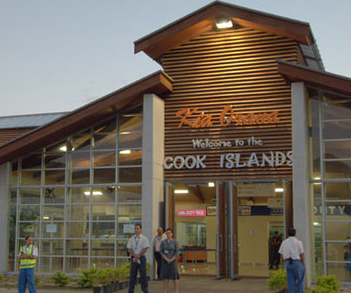
As long as you're staying no more than 31 days (90 days if you're a New Zealand citizen), your valid passport is the only entry permit you need, along with proof of onward journey, the means to support yourself while on the islands and somewhere to stay. A VISA IS GRANTED ON ARRIVAL AND THERE IS NO FEE (do not be conned by websites offering to arrange a visa for a fee as they are a scam). And you can sort out the accommodation on arrival. You can stay for up to six months in total if you're a New Zealand citizen and up to two months if you're not. Fairly hefty fees are payable for visa extensions. Covid vaccination requirements for entry have now been dropped but you should still check the latest Cook Islands government advice and information here. Please also check any requirements of your own country with regard to Covid before travelling.
Visitor entry requirements in more detail
- All international (non-New Zealand) passport holders must have a passport
valid for a period of at least six months beyond their intended period of
stay in the Cook Islands. This will allow you a stay of up to 31 days in
the Cook Islands
- All New Zealand passport holders must have a passport valid for a period of at least seven
days beyond their intended period of stay in the Cook Islands. This will
allow New Zealand passport holders a stay of up to 90 days in the Cook
Islands.
- Visitors can apply for an extended stay before travel by completing an on-line form and paying a fee
- You must have evidence of a
valid outbound ticket or return ticket to your port of origin
- You must have proof of
accommodation during your stay in the Cook Islands and sufficient funds for your stay
- For maritime border entry to
the Cook Islands, all travellers must comply with the Customs Revenue and
Border Protection Act 2012
Note that the information above is provided in good faith. You are strongly recommended to check...
FULL DETAILS OF ALL TYPES OF VISA AND THE REQUIREMENTS AND ASSOCIATED FEES HERE (government website)
GETTING TO THE COOK ISLANDS

CLIMATE AND CLOTHING
From June to September, the days are usually warm and sunny, but you might want a lightweight sweater or jacket at night because it can get chilly sometimes. From December to March, it's a bit hotter and more humid. It also rains a bit more, so maybe an umbrella will come in handy!
CHECK OUT THE WEATHER
As a general rule, dress is casual except on Sunday (see Religion). I ran into the New Zealand High Commissioner one day in a cafe in town (as you do!) and his choice of attire was a Hawaiian style shirt and shorts!
Guidance for tourists
Tourists are asked "to show consideration towards our customs and traditions by dressing appropriately in public places especially when visiting towns, churches or villages." It's suggested they carry something to cover up when wearing swimsuits if not on a beach or around a pool, and that "nude or topless sunbathing will cause offence”. Cook’s Island Bus won't allow people on board if they turn up in just a bikini or underwear.
PEOPLE
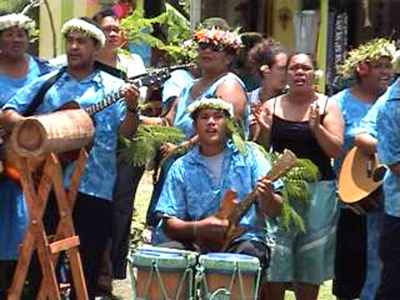
The Cook Islanders are eastern Polynesians of the Maori Race who are British Subjects and New Zealand citizens. The language is Maori but almost everyone also speaks English. The islands are a democracy based on the British Model. Don't be surprised to see locals - male and female - wearing head dresses or eis, or sometimes just a flower behind the ear (an indicator of marital status)
MORE ABOUT LANGUAGES
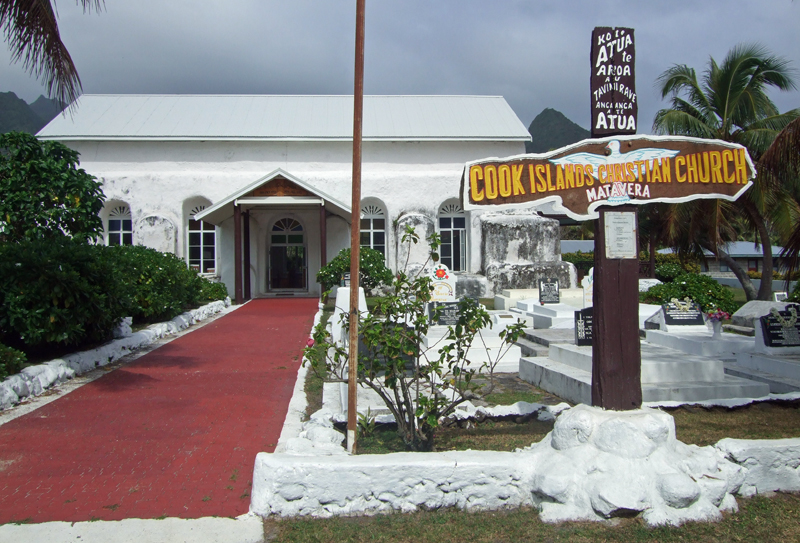
RELIGION
There's a lot of it! The majority of islanders are Protestants of the Cook Islands Christian Church (CICC), inheritors of the London Missionary Society who brought Christianity to the islands in 1821. 43.1% of locals belong to the CICC, 16.7% are Roman Catholic and 8.7% Seventh Day Adventists. Locals wear their best clothes for church - women often in white, light dresses and men in shirt and tie. The churches are filled with glorious singing you have to hear to believe and you'll be amazed at the hospitality shown to church visitors
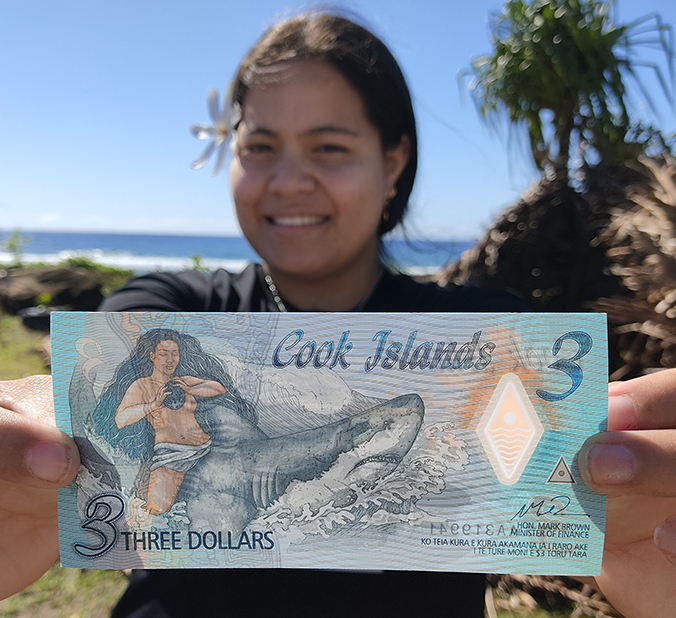
MONEY AND THE ECONOMY
The New Zealand dollar is the unit of currency. It circulates alongside locally produced notes and coins which have the same value but are not legal tender outside the Cook Islands. The $3 dollar note is a particularly popular souvenir. It features the iconic image of Ina and the Shark which has long been a part of Cook Islands folklore and legend.
Tourism generates about 70% of the nation's income. Other mainstays are agriculture and financial services. For many years, black pearls were the main export, but the industry is in decline. The distinctive stamps and coins of the islands, which are much sought after by collectors, also generate a healthy revenue
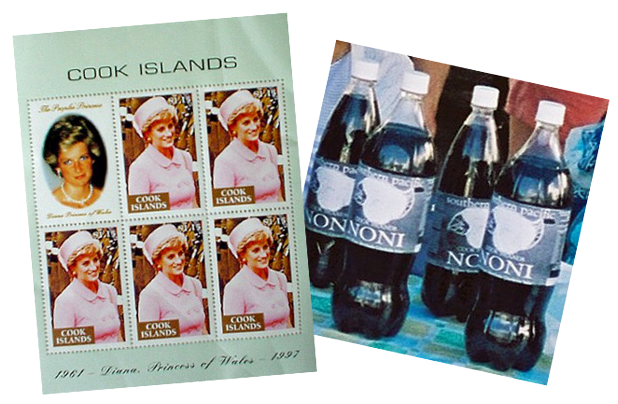
UNIQUELY COOK ISLANDS
A bottle of Noni Juice makes a souvenir to dine out on (and with?) Locals will tell you it's really good for you...and it's a taste to remember! "Perfumes of Rarotonga" will help you remember your visit with a treat for the senses. Visit their store in town or go to their "factory" where everything is done by hand. Find out more.
And of course, stamps...a visit to the Philatelic bureau in town will overwhelm you with choice even if you're not a collector
MORE SOUVENIR IDEAS
NEED TO KNOW MORE? For info about internet access, mobile (cell) phones, time zone, duty free allowances, crime, driving, plug types, smoking and vaping laws, LGBT+ and more click the button below
IN DEPTH INFO FOR VISITORS
Or check out
FREQUENTLY ASKED QUESTIONS

TAKING THE 10 MINUTE TOUR?
CLICK THE ICON TO CONTINUE






